2023年中考英语复习语法专题课件★★省略问题(共69张PPT)
文档属性
| 名称 | 2023年中考英语复习语法专题课件★★省略问题(共69张PPT) | 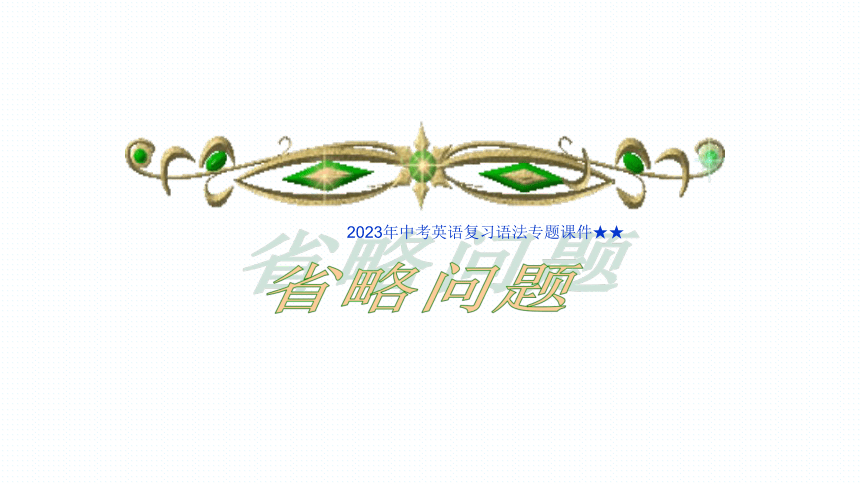 | |
| 格式 | ppt | ||
| 文件大小 | 800.5KB | ||
| 资源类型 | 教案 | ||
| 版本资源 | 通用版 | ||
| 科目 | 英语 | ||
| 更新时间 | 2022-12-11 10:05:33 | ||
图片预览

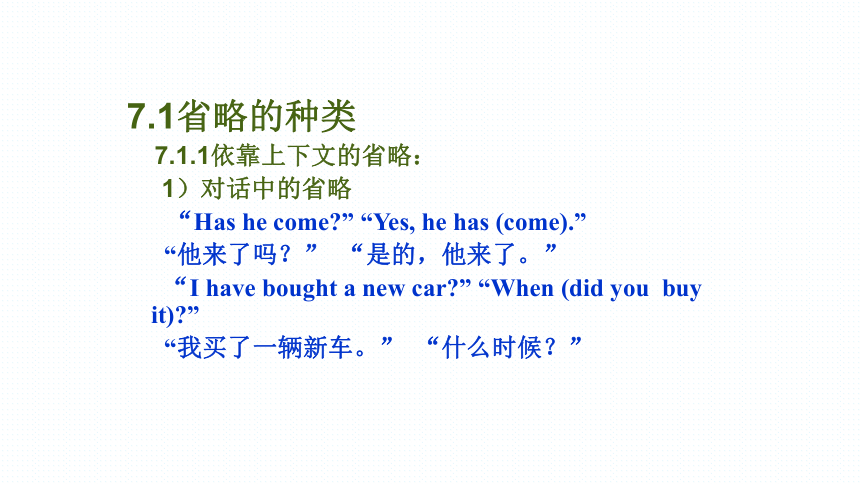
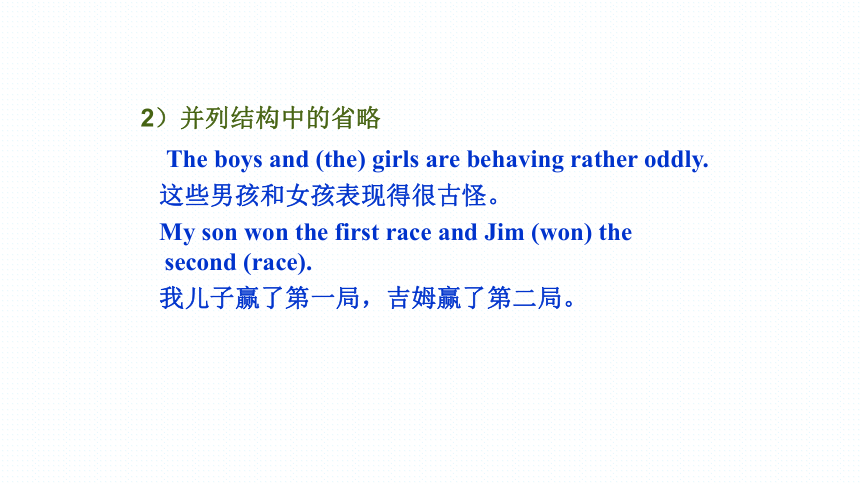
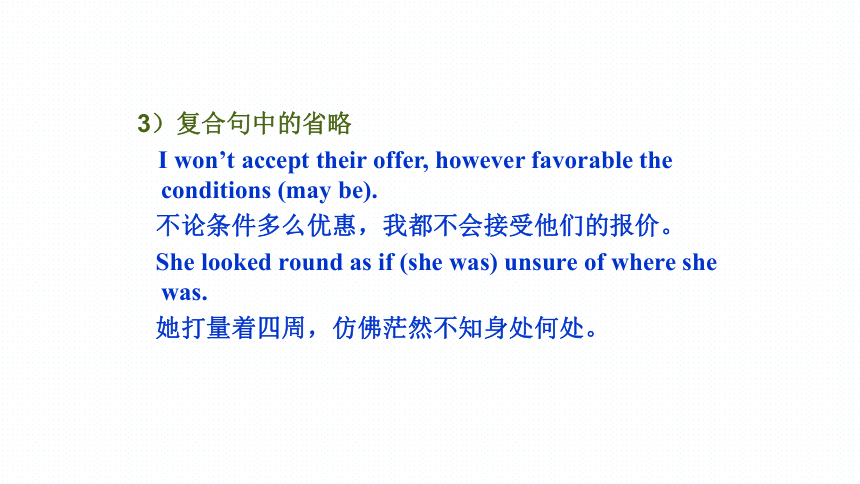
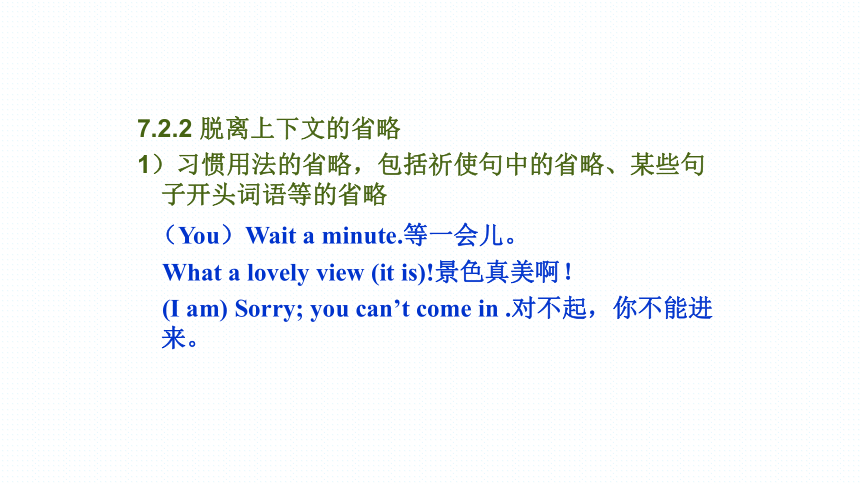
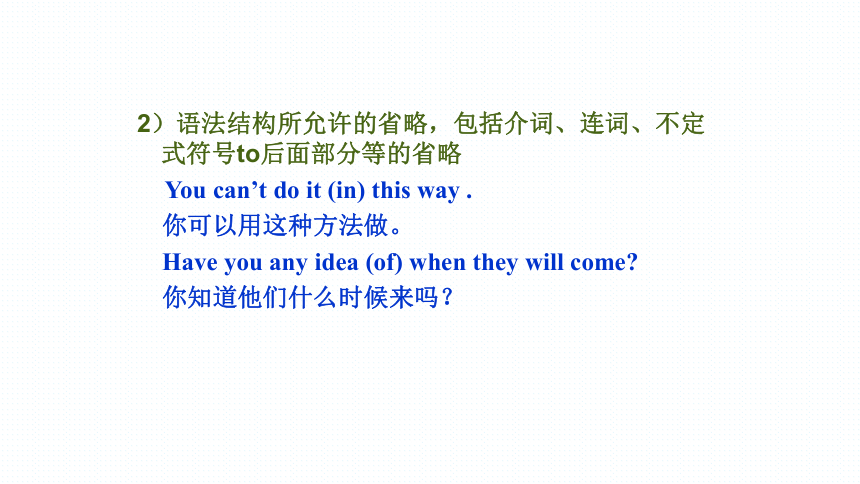
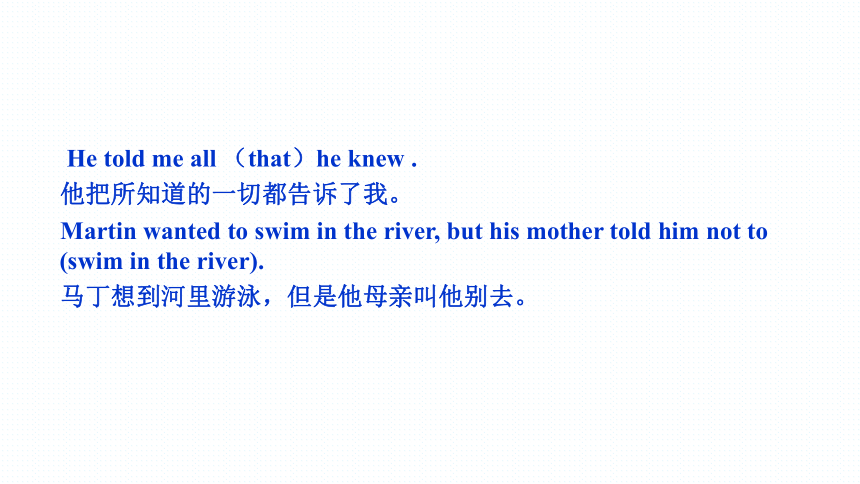
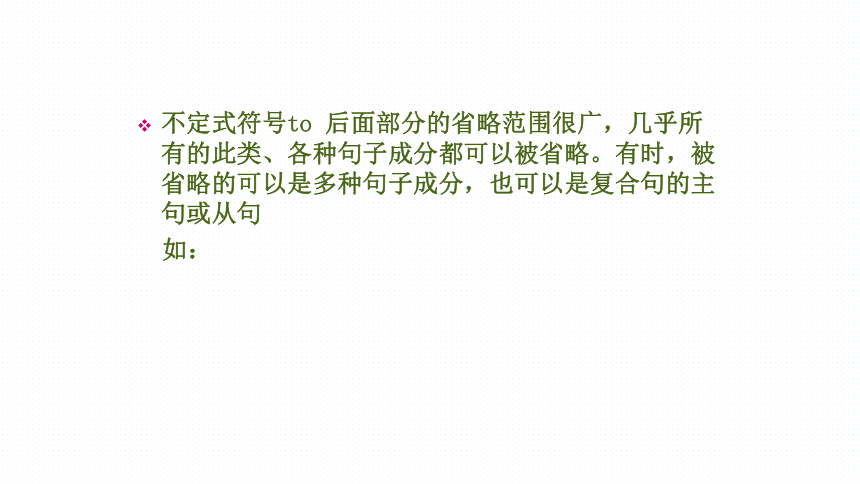
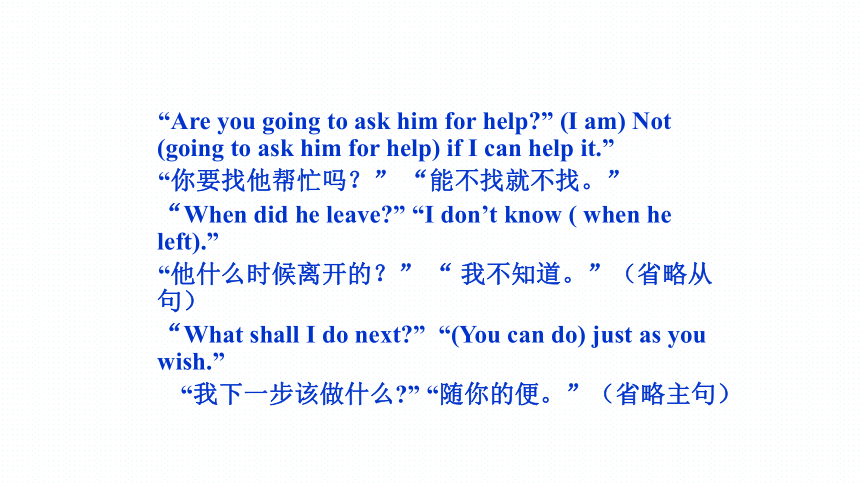
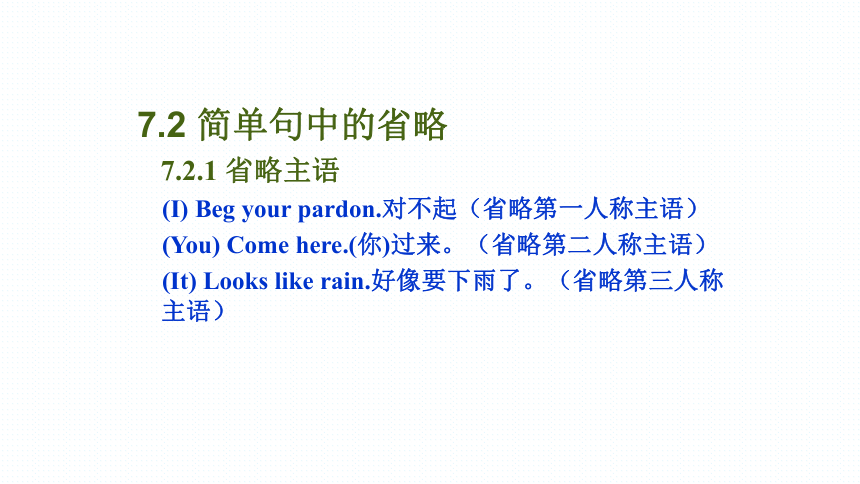
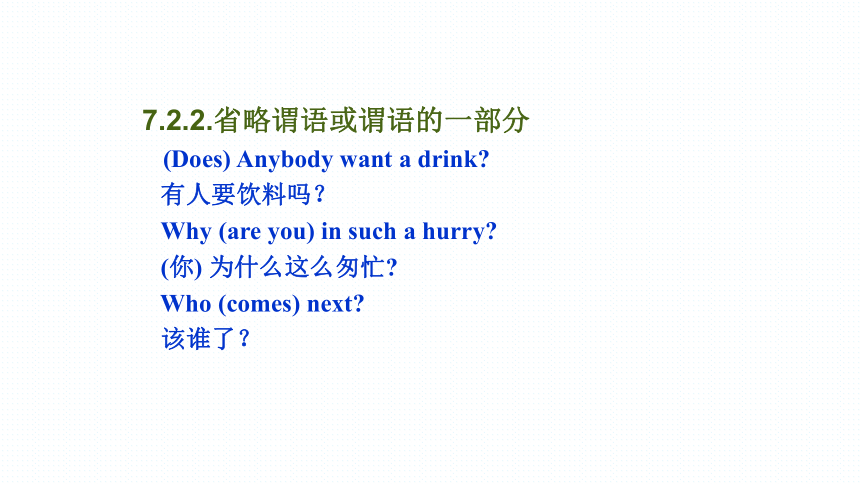
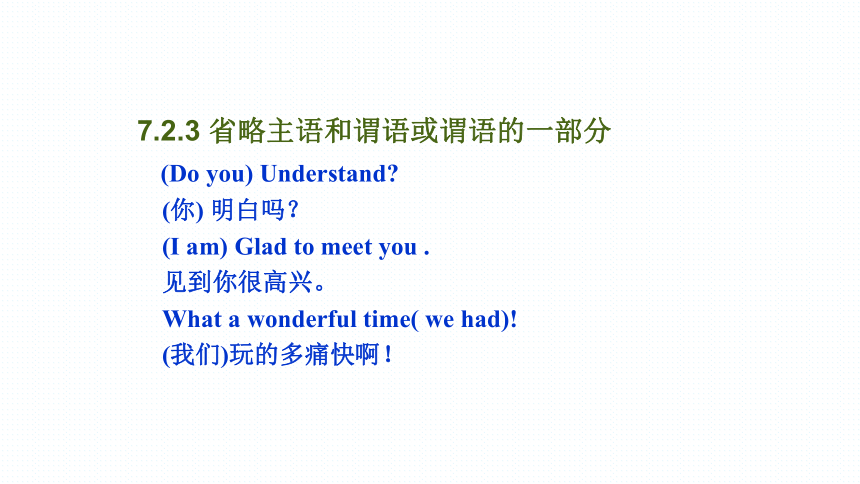
文档简介
(共69张PPT)
2023年中考英语复习语法专题课件★★
7.1省略的种类
7.1.1依靠上下文的省略:
1)对话中的省略
“Has he come ” “Yes, he has (come).”
“他来了吗?” “是的,他来了。”
“I have bought a new car ” “When (did you buy it) ”
“我买了一辆新车。” “什么时候?”
2)并列结构中的省略
The boys and (the) girls are behaving rather oddly.
这些男孩和女孩表现得很古怪。
My son won the first race and Jim (won) the second (race).
我儿子赢了第一局,吉姆赢了第二局。
3)复合句中的省略
I won’t accept their offer, however favorable the conditions (may be).
不论条件多么优惠,我都不会接受他们的报价。
She looked round as if (she was) unsure of where she was.
她打量着四周,仿佛茫然不知身处何处。
7.2.2 脱离上下文的省略
1)习惯用法的省略,包括祈使句中的省略、某些句子开头词语等的省略
(You)Wait a minute.等一会儿。
What a lovely view (it is)!景色真美啊!
(I am) Sorry; you can’t come in .对不起,你不能进来。
2)语法结构所允许的省略,包括介词、连词、不定式符号to后面部分等的省略
You can’t do it (in) this way .
你可以用这种方法做。
Have you any idea (of) when they will come
你知道他们什么时候来吗?
He told me all (that)he knew .
他把所知道的一切都告诉了我。
Martin wanted to swim in the river, but his mother told him not to (swim in the river).
马丁想到河里游泳,但是他母亲叫他别去。
不定式符号to 后面部分的省略范围很广,几乎所有的此类、各种句子成分都可以被省略。有时,被省略的可以是多种句子成分,也可以是复合句的主句或从句
如:
“Are you going to ask him for help ” (I am) Not (going to ask him for help) if I can help it.”
“你要找他帮忙吗?” “能不找就不找。”
“When did he leave ” “I don’t know ( when he left).”
“他什么时候离开的?” “ 我不知道。”(省略从句)
“What shall I do next ” “(You can do) just as you wish.”
“我下一步该做什么 ” “随你的便。”(省略主句)
7.2 简单句中的省略
7.2.1 省略主语
(I) Beg your pardon.对不起(省略第一人称主语)
(You) Come here.(你)过来。(省略第二人称主语)
(It) Looks like rain.好像要下雨了。(省略第三人称主语)
7.2.2.省略谓语或谓语的一部分
(Does) Anybody want a drink
有人要饮料吗?
Why (are you) in such a hurry
(你) 为什么这么匆忙
Who (comes) next
该谁了?
7.2.3 省略主语和谓语或谓语的一部分
(Do you) Understand
(你) 明白吗?
(I am) Glad to meet you .
见到你很高兴。
What a wonderful time( we had)!
(我们)玩的多痛快啊!
7.2.4 省略多种句子成分
“Do you like it ” “ (I do )Not ( like it )at all.”
“你喜欢它吗?” “一点也不喜欢。”
“He refused our invitation.” “Why( did he refuse it) ”
“他没接受我们的邀请,” “为什么?”
7.3 并列结构中的省略
7.3.1 词语的省略
1)省略名词短语的中心词
A.省略前面名词短语的中心词
It is either a French (movie) or an American movie.
它不是法国电影就是美国电影。
We have revised fire (regulations) and flood regulations.
我们已经修改了防火和防洪条例。
B.省略后面名词短语的中心词
He was against both the first motion and the second (motion).
第一项和第二项提议他都反对。
You must clean the windows in this room and (the windows) in that room.
你必须把这个房间和那个房间的窗户擦干净。
2)省略限定词
The books and (the) magazines don’t belong to him.
这些书籍和杂志不属于他。
I often write to my brothers and (my) sisters.
我经常给我的兄弟姐妹写信。
3)省略介词
He always drinks tea at breakfast and (at) lunch.
他早饭和午饭总是喝茶。
We heard (about) and read about his adventures.
我们听到并读到过他的种种奇遇。
4)省略连词
I was very tired, (and) so I went home.
我很累,所以我回家了。(省略并列连词)
If you have the right size and (if) the price is reasonable, I will buy it.
如果你有合适的尺寸,价钱也合理,那我就买它。 (省略从属连词)
5)省略关系词
How should I address a person whom I have not met before , or (whom) I know only slightly
我应该如何称呼以前没见过的人,或者知之甚少的人?
This is a mathematical problem which seems easy but (which) is actually hard to work out.
这是一道看起来容易,但实际上却很难解的数学题。
6)省略从句
You can come either before (he arrives) or after he arrives.
你在他到达之前或之后来都行。
I don’t know when (the contest will be held )and where the contest will be held.
我不知道比赛将在何时何地举行。
7.3.2 句子成分的省略
1)省略主语
He may see you tomorrow or (he) may call you this evening.
他可能明天去看你,或者可能今天晚上给你电话。
My sister didn’t like it, yet (she) said nothing.
我妹妹不喜欢它,但她什么也没说。
2)省略谓语和谓语的一部分
Stephen works here and his wife (works) in another company.
斯蒂芬在这里工作,他妻子在另外一家公司工作。
Bobby ought to be praised, and Roy (ought to be) blamed.
博比应该受表扬,而罗伊应该受责备。
The worldwide race to develop an affordable
synthetic fuel has so far consumed billions of dollars and__ few results.(托福题)
A. yielded
B. yielding
C. yield has
D. has a yield of
答案:A
译文:在全世界范围内进行的研制一种能够买得起的合成燃料的竞赛,迄今已耗资数十亿美元,却没取得什么成果。
3)省略表语
My father seemed angry, and my mother certainly was (angry) .
我爸爸似乎很生气,我妈妈肯定很生气。
Godwin has recently become (a member of the club), and I always been, a member of the club.
戈德温最近成了该俱乐部的成员,而我一直就是。
4)省略动词宾语
Bob planned (the house), and Tom built the house.
这所房子是由鲍勃设计、汤姆修建的。
I like (snakes), but my son fears ,snakes.
我喜欢蛇,但我的儿子怕蛇。
5)省略介词宾语
She drove to (Chicago), but her friends flew back from, Chicago.
她开车去的芝加哥,而她的朋友是乘飞机从那里返回的。
Some people are bored with (pop music), but I am fond of, pop music.
有些人厌烦流行音乐,但是我喜欢它。
6)省略定语
A group of young men and (young) women are waiting outside.
一群青年男女正在外面等候。(省略前置定语)
Most of the fruits (grown here) and vegetables grown
here are exported.
这里生产的大部分水果和蔬菜都用于出口。(省略后置定语)
7)省略状语
He lives (in Montreal) and works in Montreal.
他在蒙特利尔生活和工作。
Kitty was born (in 1974), and her parents divorced, in 1974.
基蒂生于1974年,她的父母在当年离了婚。
8)省略宾语补足语
My nephew likes his son (to be a doctor), but my niece likes her daughter, to be a doctor.
我侄子希望儿子当医生,而我的侄女则希望女儿当医生。
Becky persuaded me (to accept the compromise), and
my wife urged me, to accept the compromise.
贝基劝我接受这个妥协方案,而我的妻子则催促我这样做。
9)省略多种句子成分
Connie must have taken the course and (Connie must have ) passed examination.
想必康尼选了这门课,而且考试及格了。
He is easy in conversation and (he is) graceful in manner.
他谈吐从容,举止优雅。
7.4 复合句中的省略
7.4.1 宾语从句中的省略
1)在以疑问词who, what, which, when, where, how, why等引导的宾语从句中,疑问词后面的部分有时可以省略
如:
Somebody has parked his car here, but I don’t know who (has parked his car here).
有人把车停在这里,但我不知道是谁。
You failed again, and I hope you will explain why (you failed again).
你又失败了。我希望你能解释一下为什么。
They once visited our farm, but I forget when (they visited our farm).
他们曾经参加过我们的农场,不过我忘了是什么时候。
2)引导宾语从句的连词通常可以省略
We all know (that) 2 and 3 are 5.
我们都知道,2加3等于5.
I suppose (that) the situation will improve.
我认为情况将会改善。
3) 在believe, expect, guess, hope, imagine, suppose, think等动词后, 宾语从句只保留not
Many people think that the situation will deteriorate,
but I think not(=I don’t think the situation will deteriorate=I don’t think so).
许多人认为形势会恶化,但是我不这样认为。
“Will it rain today ” “I hope not(=I hope it won’t rain today).”
“今天会下雨吗?” “我希望今天别下雨。”
形容词afraid 后面的补语从句也有与hope 相同的用法
“Has he come home yet ” “I’m afraid not(=I’m afraid he has not come home yet).”
“他到家了吗?” “恐怕还没有。”
7.4.2 定语从句中的省略
1)the same …as 引导的定语从句中的部分内容通常可以省略
He was about the same age as Philip (was).
他的年龄和菲利普相仿。
You have made the same mistake as (you made) last time.
你犯了和上一次同样的错误。
2)关系代词的省略
Who (m), which 或that 在从句中作动词宾语时可以省略
The actress (whom/ who/ that) he admired so much died last week.
他崇拜不已的那位女演员上个星期去世了。
The coat (which/ that) I washed yesterday is still wet.
我昨天洗的上衣还是湿的。
B. Who (m), which或that 在从句中作位于句末的介词宾语时可以省略
The friend (whom/who/that) I was traveling with is a doctor.
和我一起旅行的那个朋友是一位医生。
Is this the book (which/that) you asked me for
这是不是你曾经跟我说的那本书
that 在there be 句型的定语从句中作主语 时可以省略
This is the only analytical balance (that) there is in the lab.
这是实验室里仅有的一架分析天平。
You may keep the money (that) there is left after buying your hat.
你可以留着买帽子剩的钱。
D. that在定语从句中作表语时可以省略
She is not the cheerful woman (that) she used to be.
她已经不是过去那个快乐的女人了。
They don’t seem to be the rare apparatuses (that)
they were then.
它们似乎并不是当年那样的珍贵的仪器了。
E. that在定语从句中作宾语补足语时可以省略
I am not the coward (that) you thought me .
我并是你曾认为的那个懦夫。
7.4.3 状语从句中的省略
1)在时间状语从句中,省略的通常是主语和 be 的某种形式
She was fond of dancing when (she was) yet a child.
她还是小孩子的时候就喜欢跳舞。
Call him back when (it is ) necessary.
必要时就把他叫回来。
2)在地点状语从句中,省略的通常是主语和be 的某种形式
Where (it is ) possible ,all moving parts should be tested.
凡是有可能,所有活动部件都应该检验。
Make changes in the following sentences where (it is)
necessary.
根据需要改变下列句子。
3)在条件状语从句中
省略主语和be 的形式
The information is important, if (it is ) true.
如果属实,这条信息很重要。
If (you are) in trouble, don’t hesitate to call me.
如果有困难,尽管给我打电话。
Glass won’t expand unless (it is) heated.
玻璃不加热就不会膨胀。
B. 省略谓语的部分
John will come if you will (come).
要是你来,约翰就来。
I’ll pay for the hotel if you (pay) for the food.
如果你付餐费我就付住宿费。
C. 省略谓语的一部分和宾语
I’ll visit the British Museum if you will (visit it)
too.
如果你也去参观大英博物馆的话,我就去。
D. 省略谓语的一部分和状语
I will do it in this way if you will (do it in this way ).
如果你用这种方法做,我也这样做。
E. 省略表语
I am happy if you are (happy).
你高兴我就高兴。
D. 从句中只保留not, 而省略其他成分
Go to bed, if not(= if you don’t go to bed), I’ll tell Father.
睡觉去。要不然我就告诉爸爸。
4)在让步状语从句中
A. 省略主语和be 的某种形式
Though (she was) no swimmer, Louise jumped into the river to save the child.
虽然不会游泳,路易斯仍然跳进河里去救那个孩子。
Although (he was) exhausted, he could not go to sleep.
尽管他筋疲力尽,但却无法入睡。
His opinion, whether (it is) right or wrong, should be considered.
他的意见,不管对不对,都应该考虑。
B. 省略“情态动词+ be” 或主语和 “情态动词+be”
The bridge must be completed, whatever the cost (may be).
不管费用多高,这座桥必须建成。
An element remains its identity, however finely (it may be) divided.
不论分的多么细,元素仍保持其同一性。
5)在方式状语从句中
A. 省略主语和be 的某种形式,只保留形容词、介词短语、不定式、现在分词、过去分词等
Polly slammed the door as though (she was) angry.
波利猛地关上了门,好像很生气。
She looked here and there as if (she was) in search of something.
她这儿看看,那儿看看。
He paused, as if (he was) to let the painful memories pass.
他停下来,似乎要让这些痛苦的记忆过去。
She locked the cupboard quickly, as if (she was) trying to hide something from us.
她很快把柜子关上,好想要把什么东西藏起来,不让我们看见。
They did it as (they were) requested.
他们按要求做了这件事。
He fell off his horse as if (he had been) shot.
他从马上落下,好像被射中了。
B.省略谓语的一部分
He slept heavily as he had (slept) the night before.
和头一天晚上一样,他睡得很沉。
C.省略主语和谓语
As soon as the rain stopped, the sun shone as (it did) before.
雨一停,太阳又照旧光芒四射了。
She opened her lips as if (she was going ) to say
something.
她动了动嘴唇,好像要说什么。
D.省略表语
Shakespeare was the author of Macbeth, as he was (the author) of Julius Caesar.
莎士比亚是《尤里乌斯.凯撒》的作者,也是《麦克白》的作者。
6)在比较状语从句中
A. 省略作主语的what
You have talked more than (what) is necessary.
你讲得太多了。
To understand the situation completely requires more thought than (what) has been given thus far.
充分了解局势需要更多的关注。
He eats just as much as (what) is good for him.
他吃得总是恰到好处。
B.省略作宾语的what
They got more than (what) they asked for.
他们得到的比要求的多。
He ate more than (what) he could digest.
他吃了很多,消化不了。
C. 省略谓语动词
He runs faster than I (run).
他跑得比我快。
Kate is as diligent as you (are).
凯特和你一样勤奋。
There are twice as many stools as (there are)chairs.
凳子比椅子多一倍。
D. 省略主语和谓语或谓语的一部分
It was not so hot yesterday as (it is) today.
昨天没有今天热。
I know you better than (I know)him.
我了解他,更了解你。
He speaks English as fluently as (he speaks) Chinese.
他的英语说得和汉语一样流利。
Such emotion is more easily conceived than (it is) described.
这样的感情意会容易,言传难。
E. 省略谓语和宾语
I know you better than he (knows you).
我比他更了解你。
They respect him as much as (they respect) me.
他们对我和他同样尊敬。
F. 省略主语、谓语和宾语
My sister played the piano better before than (she plays it) now.
我妹妹以前弹钢琴比现在好。
I have met Jessie as often this year as (I met her) last year.
我今年和去年一样经常见到杰西。
G.省略表语
This is as true of nations as it is (true) of individuals.
个人是这样,国家也是这样。
H.省略从句
He swims faster than I expect (that he swims).
他游起泳来比我料想得快。
7)在比例状语从句中,被省略的通常是be 的某种形式,在其主句也可以出现这种省略
The greater the resistance of a substance (is) ,the less its conductivity is.
物质的电阻愈大,其导电率就愈小。
The brighter the light (is) ,the darker the lens
(are).
光线越亮,这些镜片就越暗。
Exercise Seven
1.Some companies have introduced flexible working time with less emphasis on pressure __ .
A. than more on efficiency
B. and more efficiency
C. and more on efficiency
D. than efficiency
2. No matter how frequently __ ,the works of Beethoven always attract large audiences.
A. performing
B. performed
C. to be performed
D. being performed
3. In no circumstance can more work be got out of a machine than __ .
A. is put into it
B. to put it into it
C. to be put into it
D. that puts into it
答案
1.C
译文:有些公司采用了灵活的工作时间,较少地强调压力,而较多地强调效率。
2.B
译文:无论贝多芬的作品被多么频繁地演出,总是吸引着大量的听众。
此处 performed相当于they may be performed.
3.A
译文:机器的产出绝不会大于投入。
此处is 前省略了what.
2023年中考英语复习语法专题课件★★
7.1省略的种类
7.1.1依靠上下文的省略:
1)对话中的省略
“Has he come ” “Yes, he has (come).”
“他来了吗?” “是的,他来了。”
“I have bought a new car ” “When (did you buy it) ”
“我买了一辆新车。” “什么时候?”
2)并列结构中的省略
The boys and (the) girls are behaving rather oddly.
这些男孩和女孩表现得很古怪。
My son won the first race and Jim (won) the second (race).
我儿子赢了第一局,吉姆赢了第二局。
3)复合句中的省略
I won’t accept their offer, however favorable the conditions (may be).
不论条件多么优惠,我都不会接受他们的报价。
She looked round as if (she was) unsure of where she was.
她打量着四周,仿佛茫然不知身处何处。
7.2.2 脱离上下文的省略
1)习惯用法的省略,包括祈使句中的省略、某些句子开头词语等的省略
(You)Wait a minute.等一会儿。
What a lovely view (it is)!景色真美啊!
(I am) Sorry; you can’t come in .对不起,你不能进来。
2)语法结构所允许的省略,包括介词、连词、不定式符号to后面部分等的省略
You can’t do it (in) this way .
你可以用这种方法做。
Have you any idea (of) when they will come
你知道他们什么时候来吗?
He told me all (that)he knew .
他把所知道的一切都告诉了我。
Martin wanted to swim in the river, but his mother told him not to (swim in the river).
马丁想到河里游泳,但是他母亲叫他别去。
不定式符号to 后面部分的省略范围很广,几乎所有的此类、各种句子成分都可以被省略。有时,被省略的可以是多种句子成分,也可以是复合句的主句或从句
如:
“Are you going to ask him for help ” (I am) Not (going to ask him for help) if I can help it.”
“你要找他帮忙吗?” “能不找就不找。”
“When did he leave ” “I don’t know ( when he left).”
“他什么时候离开的?” “ 我不知道。”(省略从句)
“What shall I do next ” “(You can do) just as you wish.”
“我下一步该做什么 ” “随你的便。”(省略主句)
7.2 简单句中的省略
7.2.1 省略主语
(I) Beg your pardon.对不起(省略第一人称主语)
(You) Come here.(你)过来。(省略第二人称主语)
(It) Looks like rain.好像要下雨了。(省略第三人称主语)
7.2.2.省略谓语或谓语的一部分
(Does) Anybody want a drink
有人要饮料吗?
Why (are you) in such a hurry
(你) 为什么这么匆忙
Who (comes) next
该谁了?
7.2.3 省略主语和谓语或谓语的一部分
(Do you) Understand
(你) 明白吗?
(I am) Glad to meet you .
见到你很高兴。
What a wonderful time( we had)!
(我们)玩的多痛快啊!
7.2.4 省略多种句子成分
“Do you like it ” “ (I do )Not ( like it )at all.”
“你喜欢它吗?” “一点也不喜欢。”
“He refused our invitation.” “Why( did he refuse it) ”
“他没接受我们的邀请,” “为什么?”
7.3 并列结构中的省略
7.3.1 词语的省略
1)省略名词短语的中心词
A.省略前面名词短语的中心词
It is either a French (movie) or an American movie.
它不是法国电影就是美国电影。
We have revised fire (regulations) and flood regulations.
我们已经修改了防火和防洪条例。
B.省略后面名词短语的中心词
He was against both the first motion and the second (motion).
第一项和第二项提议他都反对。
You must clean the windows in this room and (the windows) in that room.
你必须把这个房间和那个房间的窗户擦干净。
2)省略限定词
The books and (the) magazines don’t belong to him.
这些书籍和杂志不属于他。
I often write to my brothers and (my) sisters.
我经常给我的兄弟姐妹写信。
3)省略介词
He always drinks tea at breakfast and (at) lunch.
他早饭和午饭总是喝茶。
We heard (about) and read about his adventures.
我们听到并读到过他的种种奇遇。
4)省略连词
I was very tired, (and) so I went home.
我很累,所以我回家了。(省略并列连词)
If you have the right size and (if) the price is reasonable, I will buy it.
如果你有合适的尺寸,价钱也合理,那我就买它。 (省略从属连词)
5)省略关系词
How should I address a person whom I have not met before , or (whom) I know only slightly
我应该如何称呼以前没见过的人,或者知之甚少的人?
This is a mathematical problem which seems easy but (which) is actually hard to work out.
这是一道看起来容易,但实际上却很难解的数学题。
6)省略从句
You can come either before (he arrives) or after he arrives.
你在他到达之前或之后来都行。
I don’t know when (the contest will be held )and where the contest will be held.
我不知道比赛将在何时何地举行。
7.3.2 句子成分的省略
1)省略主语
He may see you tomorrow or (he) may call you this evening.
他可能明天去看你,或者可能今天晚上给你电话。
My sister didn’t like it, yet (she) said nothing.
我妹妹不喜欢它,但她什么也没说。
2)省略谓语和谓语的一部分
Stephen works here and his wife (works) in another company.
斯蒂芬在这里工作,他妻子在另外一家公司工作。
Bobby ought to be praised, and Roy (ought to be) blamed.
博比应该受表扬,而罗伊应该受责备。
The worldwide race to develop an affordable
synthetic fuel has so far consumed billions of dollars and__ few results.(托福题)
A. yielded
B. yielding
C. yield has
D. has a yield of
答案:A
译文:在全世界范围内进行的研制一种能够买得起的合成燃料的竞赛,迄今已耗资数十亿美元,却没取得什么成果。
3)省略表语
My father seemed angry, and my mother certainly was (angry) .
我爸爸似乎很生气,我妈妈肯定很生气。
Godwin has recently become (a member of the club), and I always been, a member of the club.
戈德温最近成了该俱乐部的成员,而我一直就是。
4)省略动词宾语
Bob planned (the house), and Tom built the house.
这所房子是由鲍勃设计、汤姆修建的。
I like (snakes), but my son fears ,snakes.
我喜欢蛇,但我的儿子怕蛇。
5)省略介词宾语
She drove to (Chicago), but her friends flew back from, Chicago.
她开车去的芝加哥,而她的朋友是乘飞机从那里返回的。
Some people are bored with (pop music), but I am fond of, pop music.
有些人厌烦流行音乐,但是我喜欢它。
6)省略定语
A group of young men and (young) women are waiting outside.
一群青年男女正在外面等候。(省略前置定语)
Most of the fruits (grown here) and vegetables grown
here are exported.
这里生产的大部分水果和蔬菜都用于出口。(省略后置定语)
7)省略状语
He lives (in Montreal) and works in Montreal.
他在蒙特利尔生活和工作。
Kitty was born (in 1974), and her parents divorced, in 1974.
基蒂生于1974年,她的父母在当年离了婚。
8)省略宾语补足语
My nephew likes his son (to be a doctor), but my niece likes her daughter, to be a doctor.
我侄子希望儿子当医生,而我的侄女则希望女儿当医生。
Becky persuaded me (to accept the compromise), and
my wife urged me, to accept the compromise.
贝基劝我接受这个妥协方案,而我的妻子则催促我这样做。
9)省略多种句子成分
Connie must have taken the course and (Connie must have ) passed examination.
想必康尼选了这门课,而且考试及格了。
He is easy in conversation and (he is) graceful in manner.
他谈吐从容,举止优雅。
7.4 复合句中的省略
7.4.1 宾语从句中的省略
1)在以疑问词who, what, which, when, where, how, why等引导的宾语从句中,疑问词后面的部分有时可以省略
如:
Somebody has parked his car here, but I don’t know who (has parked his car here).
有人把车停在这里,但我不知道是谁。
You failed again, and I hope you will explain why (you failed again).
你又失败了。我希望你能解释一下为什么。
They once visited our farm, but I forget when (they visited our farm).
他们曾经参加过我们的农场,不过我忘了是什么时候。
2)引导宾语从句的连词通常可以省略
We all know (that) 2 and 3 are 5.
我们都知道,2加3等于5.
I suppose (that) the situation will improve.
我认为情况将会改善。
3) 在believe, expect, guess, hope, imagine, suppose, think等动词后, 宾语从句只保留not
Many people think that the situation will deteriorate,
but I think not(=I don’t think the situation will deteriorate=I don’t think so).
许多人认为形势会恶化,但是我不这样认为。
“Will it rain today ” “I hope not(=I hope it won’t rain today).”
“今天会下雨吗?” “我希望今天别下雨。”
形容词afraid 后面的补语从句也有与hope 相同的用法
“Has he come home yet ” “I’m afraid not(=I’m afraid he has not come home yet).”
“他到家了吗?” “恐怕还没有。”
7.4.2 定语从句中的省略
1)the same …as 引导的定语从句中的部分内容通常可以省略
He was about the same age as Philip (was).
他的年龄和菲利普相仿。
You have made the same mistake as (you made) last time.
你犯了和上一次同样的错误。
2)关系代词的省略
Who (m), which 或that 在从句中作动词宾语时可以省略
The actress (whom/ who/ that) he admired so much died last week.
他崇拜不已的那位女演员上个星期去世了。
The coat (which/ that) I washed yesterday is still wet.
我昨天洗的上衣还是湿的。
B. Who (m), which或that 在从句中作位于句末的介词宾语时可以省略
The friend (whom/who/that) I was traveling with is a doctor.
和我一起旅行的那个朋友是一位医生。
Is this the book (which/that) you asked me for
这是不是你曾经跟我说的那本书
that 在there be 句型的定语从句中作主语 时可以省略
This is the only analytical balance (that) there is in the lab.
这是实验室里仅有的一架分析天平。
You may keep the money (that) there is left after buying your hat.
你可以留着买帽子剩的钱。
D. that在定语从句中作表语时可以省略
She is not the cheerful woman (that) she used to be.
她已经不是过去那个快乐的女人了。
They don’t seem to be the rare apparatuses (that)
they were then.
它们似乎并不是当年那样的珍贵的仪器了。
E. that在定语从句中作宾语补足语时可以省略
I am not the coward (that) you thought me .
我并是你曾认为的那个懦夫。
7.4.3 状语从句中的省略
1)在时间状语从句中,省略的通常是主语和 be 的某种形式
She was fond of dancing when (she was) yet a child.
她还是小孩子的时候就喜欢跳舞。
Call him back when (it is ) necessary.
必要时就把他叫回来。
2)在地点状语从句中,省略的通常是主语和be 的某种形式
Where (it is ) possible ,all moving parts should be tested.
凡是有可能,所有活动部件都应该检验。
Make changes in the following sentences where (it is)
necessary.
根据需要改变下列句子。
3)在条件状语从句中
省略主语和be 的形式
The information is important, if (it is ) true.
如果属实,这条信息很重要。
If (you are) in trouble, don’t hesitate to call me.
如果有困难,尽管给我打电话。
Glass won’t expand unless (it is) heated.
玻璃不加热就不会膨胀。
B. 省略谓语的部分
John will come if you will (come).
要是你来,约翰就来。
I’ll pay for the hotel if you (pay) for the food.
如果你付餐费我就付住宿费。
C. 省略谓语的一部分和宾语
I’ll visit the British Museum if you will (visit it)
too.
如果你也去参观大英博物馆的话,我就去。
D. 省略谓语的一部分和状语
I will do it in this way if you will (do it in this way ).
如果你用这种方法做,我也这样做。
E. 省略表语
I am happy if you are (happy).
你高兴我就高兴。
D. 从句中只保留not, 而省略其他成分
Go to bed, if not(= if you don’t go to bed), I’ll tell Father.
睡觉去。要不然我就告诉爸爸。
4)在让步状语从句中
A. 省略主语和be 的某种形式
Though (she was) no swimmer, Louise jumped into the river to save the child.
虽然不会游泳,路易斯仍然跳进河里去救那个孩子。
Although (he was) exhausted, he could not go to sleep.
尽管他筋疲力尽,但却无法入睡。
His opinion, whether (it is) right or wrong, should be considered.
他的意见,不管对不对,都应该考虑。
B. 省略“情态动词+ be” 或主语和 “情态动词+be”
The bridge must be completed, whatever the cost (may be).
不管费用多高,这座桥必须建成。
An element remains its identity, however finely (it may be) divided.
不论分的多么细,元素仍保持其同一性。
5)在方式状语从句中
A. 省略主语和be 的某种形式,只保留形容词、介词短语、不定式、现在分词、过去分词等
Polly slammed the door as though (she was) angry.
波利猛地关上了门,好像很生气。
She looked here and there as if (she was) in search of something.
她这儿看看,那儿看看。
He paused, as if (he was) to let the painful memories pass.
他停下来,似乎要让这些痛苦的记忆过去。
She locked the cupboard quickly, as if (she was) trying to hide something from us.
她很快把柜子关上,好想要把什么东西藏起来,不让我们看见。
They did it as (they were) requested.
他们按要求做了这件事。
He fell off his horse as if (he had been) shot.
他从马上落下,好像被射中了。
B.省略谓语的一部分
He slept heavily as he had (slept) the night before.
和头一天晚上一样,他睡得很沉。
C.省略主语和谓语
As soon as the rain stopped, the sun shone as (it did) before.
雨一停,太阳又照旧光芒四射了。
She opened her lips as if (she was going ) to say
something.
她动了动嘴唇,好像要说什么。
D.省略表语
Shakespeare was the author of Macbeth, as he was (the author) of Julius Caesar.
莎士比亚是《尤里乌斯.凯撒》的作者,也是《麦克白》的作者。
6)在比较状语从句中
A. 省略作主语的what
You have talked more than (what) is necessary.
你讲得太多了。
To understand the situation completely requires more thought than (what) has been given thus far.
充分了解局势需要更多的关注。
He eats just as much as (what) is good for him.
他吃得总是恰到好处。
B.省略作宾语的what
They got more than (what) they asked for.
他们得到的比要求的多。
He ate more than (what) he could digest.
他吃了很多,消化不了。
C. 省略谓语动词
He runs faster than I (run).
他跑得比我快。
Kate is as diligent as you (are).
凯特和你一样勤奋。
There are twice as many stools as (there are)chairs.
凳子比椅子多一倍。
D. 省略主语和谓语或谓语的一部分
It was not so hot yesterday as (it is) today.
昨天没有今天热。
I know you better than (I know)him.
我了解他,更了解你。
He speaks English as fluently as (he speaks) Chinese.
他的英语说得和汉语一样流利。
Such emotion is more easily conceived than (it is) described.
这样的感情意会容易,言传难。
E. 省略谓语和宾语
I know you better than he (knows you).
我比他更了解你。
They respect him as much as (they respect) me.
他们对我和他同样尊敬。
F. 省略主语、谓语和宾语
My sister played the piano better before than (she plays it) now.
我妹妹以前弹钢琴比现在好。
I have met Jessie as often this year as (I met her) last year.
我今年和去年一样经常见到杰西。
G.省略表语
This is as true of nations as it is (true) of individuals.
个人是这样,国家也是这样。
H.省略从句
He swims faster than I expect (that he swims).
他游起泳来比我料想得快。
7)在比例状语从句中,被省略的通常是be 的某种形式,在其主句也可以出现这种省略
The greater the resistance of a substance (is) ,the less its conductivity is.
物质的电阻愈大,其导电率就愈小。
The brighter the light (is) ,the darker the lens
(are).
光线越亮,这些镜片就越暗。
Exercise Seven
1.Some companies have introduced flexible working time with less emphasis on pressure __ .
A. than more on efficiency
B. and more efficiency
C. and more on efficiency
D. than efficiency
2. No matter how frequently __ ,the works of Beethoven always attract large audiences.
A. performing
B. performed
C. to be performed
D. being performed
3. In no circumstance can more work be got out of a machine than __ .
A. is put into it
B. to put it into it
C. to be put into it
D. that puts into it
答案
1.C
译文:有些公司采用了灵活的工作时间,较少地强调压力,而较多地强调效率。
2.B
译文:无论贝多芬的作品被多么频繁地演出,总是吸引着大量的听众。
此处 performed相当于they may be performed.
3.A
译文:机器的产出绝不会大于投入。
此处is 前省略了what.
同课章节目录
